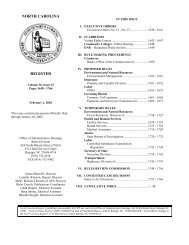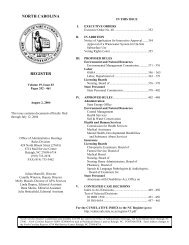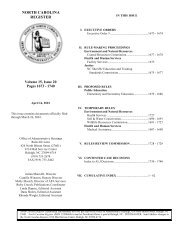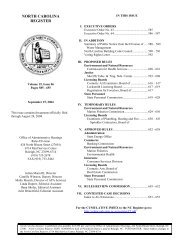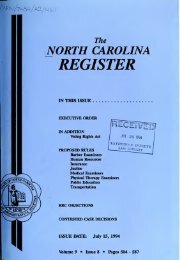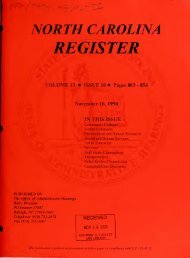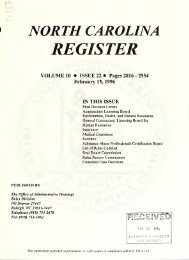NC Register Volume 21 Issue 09 - Office of Administrative Hearings
NC Register Volume 21 Issue 09 - Office of Administrative Hearings
NC Register Volume 21 Issue 09 - Office of Administrative Hearings
You also want an ePaper? Increase the reach of your titles
YUMPU automatically turns print PDFs into web optimized ePapers that Google loves.
CONTESTED CASE DECISIONS<br />
(ICF-MR). 42 U.S.C. § 1396n(c). It was stipulated by the parties that Petitioner qualifies for these services.<br />
7. The federal agency overseeing the Medicaid program, the Centers for Medicare and Medicaid Services (CMS) directs the<br />
states’ Medicaid programs by means <strong>of</strong> rules and its State Medicaid Manual (SMM). With respect to services delivered pursuant to a<br />
home and community based services waiver, such as those in dispute in this action, there exists the directive that waiver services<br />
provided by a relative may be paid for by Medicaid only if the relative meets the qualifications for providers <strong>of</strong> care and there is<br />
adequate justification as to why the relative is the provider <strong>of</strong> care. State Medicaid Manual, §4442.3<br />
8. Federal law mandates that each state participating in the Medicaid program must designate “a single state agency”<br />
responsible for the program in that state. 42 U.S.C. § 1936a(a) (5). The N.C. Department <strong>of</strong> Health and Human Services operates as<br />
this State’s single state agency.<br />
9. The N.C. Department <strong>of</strong> Health and Human Services’ rules concerning appeals by Medicaid recipients for the denial,<br />
termination or reduction in services (10A N.C.A.C. Subch. 22H) have been promulgated pursuant to the federal provisions <strong>of</strong> 42<br />
C.F.R. § 431 Subpt. E (200 to 246). These provisions, along with North Carolina’s <strong>Administrative</strong> Procedures Act, entitle Medicaid<br />
recipients requesting review <strong>of</strong> denials <strong>of</strong> requested Medicaid services to pursue their due process rights through Article 3 <strong>of</strong> Chapter<br />
150B <strong>of</strong> the N.C. General Statutes.<br />
10. The CAP/MR/DD Manual (not included in the North Carolina <strong>Administrative</strong> Code) is a nonbinding interpretative statement<br />
from Respondent which defines, interprets, and explains the federal directives, statutes and rules for Medicaid. [See, N.C. Gen. Stat.<br />
§150B-(8a)(d)]. Although the Manual sets out the requirements for eligibility for and explanation <strong>of</strong> Medicaid waiver services, it<br />
merely explains and interprets the definitions that currently exist in the binding federal and state statutes, rules, regulations and federal<br />
waiver documents.<br />
11. Violations <strong>of</strong> or failure to comply with the Manual does not have the effect <strong>of</strong> law, but failure to meet the requirement(s) set<br />
out in the federal and state statutes and regulations is/are a ground to deny Medicaid payments. The North Carolina courts have found<br />
that such a manual (though indeed authorized in its making) is not an agency rule or regulation, within the meaning <strong>of</strong> the<br />
administrative procedure act, and, although such a manual sets out requirements for Medicaid eligibility, it is an interpretative<br />
document, and noncompliance with such a manual is not <strong>of</strong> effect. Okale ex rel. Okale v. North Carolina Department <strong>of</strong> Health and<br />
Human Services, 153 N.C.App. 475, 570 S.E.2d. 741 (2002), see also, See, Little v. Catawba Mental Health, 05 DHR 1147.<br />
12. The binding federal waiver documents require that the individual delivering the service <strong>of</strong> Supported Employment “must<br />
meet requirements for a parapr<strong>of</strong>essional in 10A <strong>NC</strong>AC 27G .0100-.0200.” It was stipulated by the parties that Petitioner’s relative,<br />
his mother, meets the requirements <strong>of</strong> a parapr<strong>of</strong>essional.<br />
13. It was stipulated by the parties that Petitioner is eligible for Supported Employment.<br />
14. The preponderance <strong>of</strong> the evidence shows that Petitioner is motivated to engage in paid employment and would benefit from<br />
the opportunity.<br />
15. The preponderance <strong>of</strong> the evidence shows that the totality <strong>of</strong> Petitioner’s impairments result in an individual unique in the<br />
range <strong>of</strong> behaviors, limitations <strong>of</strong> abilities, and the predictive ability for either behaviors or abilities. These factors are complicated by<br />
a range <strong>of</strong> other health issues and lack <strong>of</strong> skills.<br />
16. The preponderance <strong>of</strong> the evidence shows that the individuals paid to deliver services, either Home and Community Supports<br />
(previously denominated as Supported Living) or respite, to Petitioner turn over at an high rate.<br />
17. The preponderance <strong>of</strong> the evidence shows that it is difficult to obtain suitable individuals to provide paid services, either<br />
Home and Community Supports (previously denominated as Supported Living) or respite, to Petitioner.<br />
18. The preponderance <strong>of</strong> the evidence shows that Petitioner suffers harm from the loss <strong>of</strong> staff and the concomitant loss <strong>of</strong><br />
consistency in the working <strong>of</strong> his Plan <strong>of</strong> Care goals.<br />
19. The preponderance <strong>of</strong> the evidence shows that Petitioner has demonstrated better than average gains in his Plan <strong>of</strong> Care goals<br />
while receiving Home and Community Support services from his relative, his mother.<br />
20. The preponderance <strong>of</strong> the evidence shows that Petitioner does not suffer detrimental social isolation. The preponderance <strong>of</strong><br />
the evidence shows that while Petitioner has clear social skills deficits, his social skills were a “relative strength.”<br />
<strong>21</strong>. The preponderance <strong>of</strong> the evidence shows that there is adequate justification as to why the relative should be the provider <strong>of</strong><br />
care, specifically that:<br />
a. Petitioner’s unique impairments<br />
b. make the recruitment and maintenance <strong>of</strong> paid service staff unduly difficult<br />
c. with the loss <strong>of</strong> consistency being harmful to Petitioner thus<br />
<strong>21</strong>:<strong>09</strong> NORTH CAROLINA REGISTER NOVEMBER 1, 2006<br />
860




